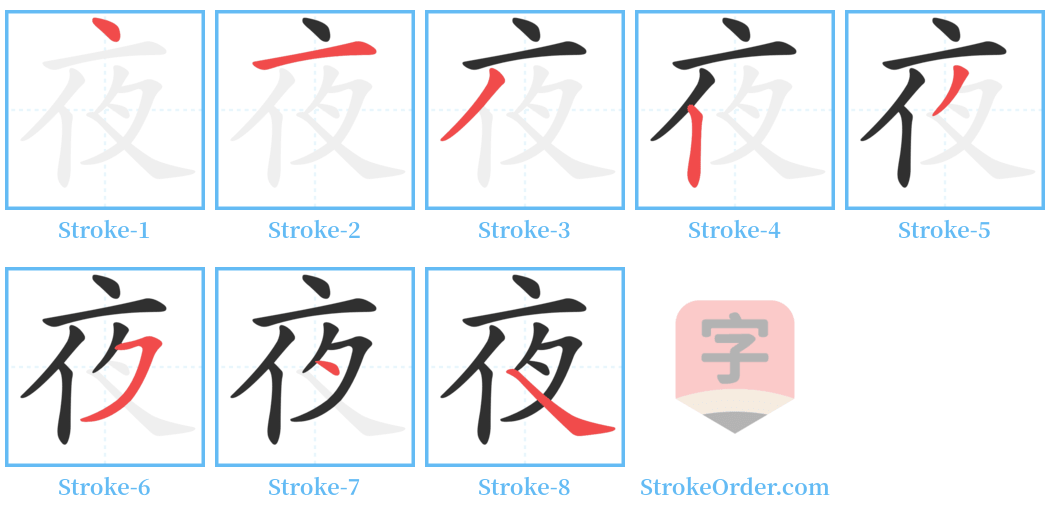夜 Stroke Order
Animated Stroke Order of 夜

Stroke Order Diagrams for 夜

Step-by-Step Handwriting Guide for 夜

Learn to Write Chinese Characters with Video Tutorials
Watch the video of writing the Chinese character "夜", learn the correct stroke order (笔顺) of the character "夜", and master the standard way of writing the character "夜".
Free Printable Handwriting Practice with Stroke Order: 夜
Printable Writing Practice Worksheet of "夜" in Portrait Orientation (Tian Zi Ge)

Printable Writing Practice Worksheet of "夜" in Landscape Orientation (Tian Zi Ge)

Information of 夜
Pinyin
yè
Radical
夕
Strokes
8 strokes
Usage
★★★★★
Definition
night
夜 (yè)
1. The time when it is dark, opposite to "day" or "daytime."
- Example: 夜晚 (nighttime), 日日夜夜 (day and night), 夜阑 (late at night), 夜盲 (night blindness), 夜幕 (nightfall), 夜宵 (night snack), 夜袭 (night raid), 夜行 (night travel), 夜战 (night battle).
2. Same as the primary meaning (night).
- [En.] night
3. Dusk, when the sky is dark.
- [En.] dusk
4. Early morning, when it is about to get light.
- [En.] in the small hours; before dawn
- Zheng Xuan noted: "夜, when the roosters crow at the end of night."
5. Dim or dusky.
- [En.] dim; dusky
引 (Citations):
1. "夜,舍也。天下休舍也。" (Shuowen)
2. "夜,暮也。" (Guangya)
3. "夜呼旦。" (Zhouli: The roosters crow at the end of the night.)
4. "辛卯夜, 恒星不见。" (Zuo Zhuan: Night refers to the time from dusk to dawn.)
5. "夜者阴。" (Zhou Bi Calculation: Night refers to shadow.)
6. "夙兴夜寐,靡有朝矣。" (Shi: Rising early and sleeping at night, having no morning.)
7. "昨夜见军帖。" (Yuefu: Saw the military post last night.)
8. "三日三夜。" (Shishuo: Three days and three nights.)
Examples:
- 夜游子 (the one who wanders at night)
- 夜里个 (last night)
- 夜合钱 (payment received by a prostitute)
- 夜行人 (a person working secretly at night, such as a thief or a chivalrous person)
- 夜不收 (night detective; also refers to people seeking pleasure at night)
- 夜叉婆 (a fierce-looking, ugly woman)
- 夜消 (midnight snack)
- 夜台 (long night platform; grave)
- 夜夫 (night watchman)
- 夜漫漫 (long dark night; refers to suffering years)
引 (Further citations):
1. "岂不夙夜?谓行多露。" (Shi)
2. "行者怏怏自退,看看日色早已夜了。" (Journey to the West)
3. Zheng Xuan noted again: "夜, when the roosters crow at the end of night."
总结 (Summary):
夜 refers to the time from evening to morning, characterized by darkness and activities associated with the night. It also encompasses meanings related to dimness and dusk. Various classical texts further elaborate on its contextual or metaphorical usages.
Input Method for 夜
Pinyin
ye4
Wubi
ywty
Cangjie
yonk
Zhengma
snrs
Four Corner
00247
Unicode
U+591c
Same Pronunciation Characters